What It Takes To Be A Nurse
If you’re wondering “should I become a nurse,” you’re going to want to make sure you like science, have good communication skills, are detail-oriented and can problem solve, multitask and handle stressful situations. In today’s episode, Kim McAllister, an emergency room nurse with over 30 years of experience, tells us that it takes a lot more than caring about people to be a good nurse. Kim shares great career advice and all kinds of information about nursing careers.
SNEAK PEEK (Full Episode below)
|
Today’s Guest
 Emergency Room Nurse: Kim McAllister
Emergency Room Nurse: Kim McAllister
College: University of Wisconsin-Green Bay online
College Degree: Bachelor’s of Science in Nursing
Community College: Ohlone College in Freemont, CA
Community College Degree: Associate Degree in Nursing
High School: American High School in Freemont, CA
First Job Ever: Selling warranties via phone for Montgomery Ward
Worst Job Ever: See First Job Ever!
Information About Nursing Careers
In explaining what it takes to be a nurse, Kim tells us what schooling is required to become a nurse. She advises taking lots of science classes in high school and then, because so many nursing jobs are looking for a Bachelor’s of Science in Nursing, Kim suggests going for the 4-year degree today. Kim spent most of her nursing career with a 2-year Associate’s Degree in Nursing and from her experience believes another great route is to get the ADN to start your nursing career and then, while getting real life work experience, keep going to school on the side to earn your BSN. In addition to this great advice, Kim walks us through a typical day and provides an ER nurse job description.
Should I Become A Nurse
The good news is that a nursing shortage is right around the corner as the Baby Boomers age and older nurses retire. For now, Kim says the job market is a little tight.
She suggests that if you have what it takes to be a nurse and put yourself through what schooling is required to become a nurse, you should keep your mind open beyond nursing in hospitals. This is because you may find more employment opportunities in home care, long-term care facilities and rehabilitation facilities. Kim even suggests doing volunteer work at a clinic if you’re looking to get some work experience.
After watching the videos full of information about nursing careers, do you think it’s the right career for you? Let us know in the Comments!
FULL EPISODE (#37)
For our Audio Podcast: Careers Out There on iTunes
TRANSCRIPT OF TODAY’S INTERVIEW
ER Nurse Job Description 7:48-13:17
Nursing Careers For Those With Children 13:17-14:33
Pros of Being a Nurse 14:33-15:29
Challenges of Nursing Careers 15:29-16:40 and 19:15-19:55
Who Should Become a Nurse 16:40-17:38
Skills For Nursing 17:38-19:15
What Schooling Is Required To Become A Nurse 19:55-28:28
Nursing Shortage & Where Are Nurses Needed 28:28-31:52
Keys To Success for Nurses 31:52Careers Out There Host Marc Luber: Hey everyone – welcome to Careers Out There. I’m your host Marc Luber and we’re helping you find a career that fits you. In every episode of Careers Out There, we explore a career path by talking to a real professional who does that kind of work – and they’ll share with us what it’s really like – and then all kinds of advice to help you decide if it’s a path you want to pursue. In today’s episode, we’re looking at Nursing Careers and our guest is Kim McAllister. She’s an emergency room nurse in Northern California and a 30 year veteran of the nursing profession! She’s got a great blog that talks about the life and times of being an ER nurse – and it’s called Emergiblog. You can find it at Emergiblog.com. Kim’s got a lot to tell us about nursing careers so it’s gonna be a great episode. Stick around! [theme song] OK we’re back – Kim McAllister, welcome to Careers Out There.ER Nurse Kim McAllister: Hi. Thanks for having me!
[WHAT IS IT LIKE TO BE A NURSE starts at 0:58]
Luber: Definitely. Thank you for being here. We had a great talk on the phone the other day and you were telling me how a lot of people don’t really understand nursing – that they see it on TV and they really get the wrong impression of what nursing is. Can you tell us about that and tell us what nursing REALLY is like?
Kim McAllister: Yeah. The impression you get from TV is that nursing is basically non-existent and they don’t do anything but basically hover in the background, and that’s not the case. Nursing is not like what you see on TV at all. Nursing is extremely hard work. It’s basically the backbone of the healthcare profession. Nursing is a really demanding profession. Nurses do everything – from resuscitating a trauma patient to teaching health to school kids; from delivering babies to working with the elderly in a skilled nursing facility; from working on a med search floor passing medications and caring for maybe 4 or 5 patients a night to being the sole nurse responsible for a very critical patient in an intensive care unit. And through all that, we might be doing anything from a blood pressure to maybe doing CPR and saving a patient’s life, putting in an IV or dealing with a patient who’s on ten IV drips that are saving his life. In the ER, I might be doing something as simple as consoling a child who’s crying and putting a band-aid on a boo-boo, literally! Or I might be defibrillating, shocking someone’s chest. So nurses do a variety of things but we’re the ones who are there at the bedside actually providing the care that the patient needs. One of the main things nursing is responsible for is teaching. And that’s teaching the patient about their illness, about their medications, about how the illness will affect their life, but most importantly how to take better care of themselves – because nursing just doesn’t focus on the illness. Nursing also focuses on health. It’s a very, very rewarding profession. And it’s one of the most trusted professions. In fact, it is THE most trusted profession. We have been voted the most trusted profession yearly. We lost to the firefighters in 2001 but the next year we got it back! We are privy to the most intimate aspects of a patient’s life from the depths of depression to the highest joys and that’s really, really a rewarding aspect of the career. And then if you’re gonna go to the practical side of it, it’s good pay for the most part, depends on where you are in the country, good pay, good benefits, flexibility with scheduling and there’s no reason to be bored when you’re a nurse because there’s a lot of different specialties that you can go into.
Luber: Now I want to share with the audience the same thing I shared with you on the phone – just my personal experience with nursing. I’ve talked a lot about my mom’s death on the website and how she died of cancer in 2002 in her 50s and she spent a full month, before going into hospice at the end, living in a hospital going through all kinds of treatment. So I was spending a lot of time at the hospital and I was blown away by how hard the nurses worked. I really never had any idea how much of just an intense, serious job – and the two things that I walked away with the most – the 2 things I think about are: hard work and caring. They treated my mom, depending on their age, like either she was their sister or mother. I was so moved by that, you know, after she passed away I had to go back and I bought them this giant Hallmark card just saying “thank you”. And I never thought I would do that [because I didn’t want to see the hospital again at that point] but I was so impressed by how much they acted like they cared -whether it was real or a great acting job. They acted like they cared and they made her feel that way. And they worked hard at lifting and hauling her around and getting her out of bed into a wheelchair and taking her to different appointments and handling her food and keeping her comfortable – everything – bathroom obligations, all kinds of stuff. Very, very impressive. It is an amazing career. Very respectable career. So, I just wanted to share my personal thing there. At least 20 of your 30-plus years in nursing have been in the ER – in emergency rooms – but you’ve also worked in other areas. Tell us about some of the other areas of nursing you’ve worked in.
Kim McAllister: I actually started out briefly working a medical surgical unit at a VA hospital, so I had a little bit of general floor experience and then went into coronary care. That was a wonderful experience. I got to know the ins and outs of working with heart patients. Moved into intensive care and from there one day I thought “I’ll never go into ER, why would anybody want to do that, how frightening could that be, oh my goodness” and we had a low census in the hospital and they said “hey – you can go down and just kind of help out in the emergency room. Orient down there for a couple of days and then if the census is low, you can help out down there”. And so I did and I fell in love with it. Over the years, when I felt like I needed to take a break from the emergency room, felt a little burnout coming in, I moved in to psychiatry and worked in the psych unit for 2 and a half years. That was a fantastic experience. Then moved in for a little while, about ten years later, did some pediatric – in a pediatric clinic for a while. Both of those things helped me when I went back – and I always go back – into the emergency department.
Luber: I think that’s great that you can move around. It really helps to keep the career fresh. Would you tell people that are considering the career that basically in times of hiring you really can transfer around and use your skills in different ways?
Kim McAllister: Absolutely. I think you learn more if you do go to different facilities and you work in different areas. For me it helped because in ER you see everything and you deal with everything anyway. Kind of in ER you’re a jack of all trades anyway. You deal with psych, you deal with pediatrics, you deal with coronary care. So any experience you have in other areas all translate to emergency eventually.
[ER NURSE JOB DESCRIPTION starts at 7:48]
Luber: Um, I just want to say for people listening just on audio, there might be a slight buzz on the audio. That’s just coming from a fan in the computer. We’re not able to get that sound down so hopefully it’s not a distraction to anybody! We are aware of it and just ignore it if you can! Thank you and hopefully you don’t even hear it! Kim, tell us about being an ER nurse – specifically an ER nurse. What’s a typical day for an ER nurse?
Kim McAllister: A typical day in the ER is that there is no typical day in the ER! Every day is different and you really can’t – I always say you can’t appreciate a nice, quiet day in the ER until it’s over because you never know what you’re gonna get. But a usual day when you come in is you basically dive right in. There’s no easy segue in to the shift. When you come in, you walk right out into the department, into the melee that’s in progress and you get your report sort of on the fly from the nurse who you’re relieving and you just basically dive right in! You have an assignment basically at – in California now with the nurse-patient ratios, that’s about 3 to 4 patients, depending on the assignment. You go get report from the nurse who you’re relieving and then I immediately go right in and say “hi” to every one of those patients just to eyeball them, what’s going on, and just get an idea of where they’re at immediately. And it sounds very simple, but for the next 8 hours, I basically am taking care of those patients, discharging and then moving. And the whole idea of ER is patient flow. So you move the patients, you get them in, you take care of them as efficiently and as quickly as possible – now that doesn’t mean rushing – that just means making sure that the labs are done efficiently, that if they’re being admitted that they get up to their room as soon as possible. It’s much more comfortable for them to be up in a regular room than sitting down on that ER gurney for very long. Discharging them as soon as possible so they can get out and get moving and the next patient can come in. So basically you’re doing that for 8 hours. Of course in the middle of all that, you’ve got the patients who are going to have cardiac arrest, emergent situations, have patients that come in with an emergency that need to be seen right away and bump the patients that have been in the waiting room, so you never know.
Luber: So are you the one deciding ? If someone’s coming in, are you looking at them and saying “you’re worse off than this guy over here – you’re coming to the front of the line.” Is it kind of like that?
Kim McAllister: The triage nurse will do that.
Luber: OK.
Kim McAllister: And if the triage nurse says “you’re coming to the front of the line” and I’ve got the empty bed, I’m where that patient is gonna go. And once that patient gets to my room, I’m responsible for doing a full physical assessment on that patient, hooking them up to the cardiac monitors so I can see their heart tracing, getting a full set of vital signs. If they’re a critical patient or in a lot of pain, I’m responsible for getting in an IV so they can get pain medication. I draw blood from that, I make sure the proper tests are ordered, the blood gets t the lab, I’m responsible for monitoring those results and making sure the physician sees the critical results, I monitor any IV fluids that are ordered on that patient, I monitor – this is really important – the patient’s pain level. What it is when they come in, what it is within a half an hour to an hour after I give pain medicine, I monitor their visitors, their family, how they’re reacting to the patient and how the patient’s reacting to them…And what I basically look for is it’s all about the patient and how they’re responding. How they’re responding to the treatments and how they respond to the eventual diagnosis. So I’m not only dealing with the patient, I’m also dealing with the family, I’m dealing with all the ancillary departments: the physicians, the pharmacists, the radiology department, the housekeepers, it’s a healthcare team. And the nurse is basically the backbone of that team.
Luber: Now you’re not in a county hospital, right? You’re not dealing with gunshots and gangs and violence and all the crazy stuff, right?
Kim McAllister: No. If we get any gunshots it’s rare. In my facility they’ll be like walk-ins, so we’re not part of the knife and gun club where I work. I’ve mostly stayed in moderate sized community hospitals, not county, trauma centers or anything like that. So the big action takes place there.
Luber: So if someone watching right now is thinking of going into THAT kind of a situation, would it be just a more intense, crazy kind of pace compared to what you’re dealing with? Just more crazy stuff but an otherwise similar situation?
Kim McAllister: Yup. More of the same. They would get the walk-ins, the family type patients, the clinic patients, the abdominal pain patients, just more of that and then more of the intense trauma, more ambulance trauma, more ambulance traffic.
Luber: OK. And when you’re talking about an 8 hour shift, I believe you said you work the night shift, is that right?
Kim McAllister: Yes.
Luber: So what does that mean?
Kim McAllister: I work from 11pm to 7am. At least in my facility, it’s those hours.
Luber: OK. And so you’re up all night.
Kim McAllister. Yes.
Luber: And then you need to sleep during the day I assume?
Kim McAllister: Yes.
[NURSING CAREERS FOR THOSE WITH CHILDREN starts at 13:17]
Luber: But you’re a mom! So how did you raise children doing that and can other people watching who are thinking of going this route, do something like that? Tell us about that whole path.
Kim McAllister: Actually I’m a night person by nature, so for me it was the shift to choose. And frankly, it’s an easier shift to work when you’re raising a family than it is to work, say, the evening shift. I actually saw my kids. I could work all night, come home, get them off to school, sleep and then see them and actually have a life with my family in the evening before I went to work at night. I was chronically sleep-deprived, I’ll grant you that, but it was doable. Harder is when you’re working 3-11, the evening shift, because then you’re gone. You get them off to school in the morning, you’re gone when they get home and in bed when you get back. But it’s [night shift] definitely doable. And nursing is nice because in most places you can get full benefits for working part time. So you’re not necessarily required to work full time to get those benefits. So…
[PROS OF BEING A NURSE starts at 14:33]
Luber: That’s great. Yeah, that’s a really good thing. What would you say is the most rewarding part of being a nurse?
Kim McAllister: For me it’s knowing that I’m making a difference in somebody’s life every single day. And it doesn’t matter – yes, the shift can be hectic, it can be chaotic, it could be just the most horrible, busy, you feel like you’re sinking under all the workload every night, but when I walk out in the morning, I know I made a difference in somebody’s life somehow that night. They felt better or I made their stay in the emergency department easier because I was there. And to me that’s the most rewarding part. My work means something.
[CHALLENGES OF NURSING CAREERS starts at 15:29]
Luber: Yup. That has to be very, very rewarding. It’s gotta be great. What would you say, then, is the most challenging part?
Kim McAllister: Dealing with people at their worst. Because people who are ill are scared. Their family members are scared. Often times, you know, it’s not the patient that’s the hardest to deal with – it’s the family members, who are all so scared. And they don’t often come across as scared – they come across as angry, or they come across as short, or they come across as, to use a slang term, control freaks. So you’re dealing with many, many different personalities and family dynamics all the time – and that’s the most challenging – it’s coming in to a situation – and in the ER you’re coming in to many different situations every shift – getting a grip on the family dynamics and working within those dynamics to help that patient.
Luber: I can see that for sure. It’s gotta be – it’s a juggling game, right? Because every single situation is different.
Kim McAllister: Definitely.
[WHO SHOULD BECOME A NURSE starts at 16:40]
Luber: What about the right type of person for a nursing career? Let’s start with personality. Is there a certain personality type that you see fit best for nursing?
Kim McAllister: Almost any personality type can become – will work well with nursing – because there are so many nursing specialties out there. Any personality type will find their niche in nursing. The type of personality that gravitates to ER and critical care will be a different type of personality than will gravitate to OBGYN or pediatrics. You’ll find your place and you’ll gravitate to the area of nursing that fits you best. So I would say any personality type can be a nurse.
Luber: So anybody watching that means can….
Kim McAllister: Absolutely. Absolutely. There is a place for you in nursing.
[SKILLS FOR NURSING starts at 17:38]
Luber: Nice! What about skill sets, then. What kind of skill sets would you say someone should really be bringing to the table?
Kim McAllister: I would say you need to be detail-oriented. You can be a perfectionist – it helps – it’s not required but it helps. Most nurses I know have a little bit of OCD in them somewhere. I would say you need to be willing – you need to be smart. Nursing has a heavy, heavy knowledge-base that’s very heavy in the sciences. You need to have an interest in science. If the thought of biology and chemistry and physiology and you’re thinking “ugh”, sorry, you may want to look elsewhere – nursing is heavy, heavy science-based. Good communication skills: written and verbal.
Luber: Being able to talk to all those families, all those different people passing through?
Kim McAllister: Yup. Exactly. And I think you need to have a little bit – I call it emotional maturity, and a lot of that can come with experience. But you need to be able to keep your cool in very tense, very heated situations, because you’ll come across those pretty frequently as a nurse, whether it’s a family situation or a physician situation, and you have to keep your cool. And if you can do that then you’ll do well.
Luber: And a lot of decision-making?
Kim McAllister: Oh, every day. Every minute of every day.
Luber: Yeah.
Kim McAllister: Exactly.
[CHALLENGES OF NURSING CAREERS – PART 2 starts at 19:15]
Luber: Let’s weed some people out. Let’s say “if you can’t handle this, don’t even think about being a nurse, don’t even consider it”. What would that be?
Kim McAllister: If you can’t handle multi-tasking. And I’m talking extreme multi-tasking. In any area of nursing, don’t even try – because that is probably the one thing that a nurse is doing from the time he or she steps in to his unit until they leave. They are multi-tasking.
[WHAT SCHOOLING IS REQUIRED TO BECOME A NURSE starts at 19:55]
Luber: Very good. That’s important. OK. Hear that everybody – multi-tasking! Make sure you can do it! If someone’s thinking that they’d be a good fit for this – they can multi-task, they can do all the other things we’ve talked about, and they’re really interested in nursing, they want to go this route: maybe they’re in high school right now or maybe they’ve already started college. Are there certain classes you would recommend they start taking now?
Kim McAllister: Yeah. If you’re in high school and college both, head for the science department. Biology, chemistry. If your high school offers anatomy and physiology, get in on the ground floor. Go ahead and take it. Take all the science you possibly can: life sciences particularly, and math. Everything you can take, everything you can get, both in high school and in college to start because those will be the pre-requisites for all the nursing programs and classes.
[BSN DEGREES starts at 20:46]
Luber: So then when you go with those pre-requisites and you go to a nursing program, you could be going for an Associate’s Degree or a Bachelor’s Degree. I think this is really interesting about your path. You got your Associate’s Degree in Nursing [ADN] back in the late 1970s, but it wasn’t until 2010, just 1 year ago, when you got your Bachelor’s [BSN]! So you worked all those years and then you JUST went back to school. So it’s like you’re proof that it’s never too late to go back!
Kim McAllister: Nope! You can go back to school when you have gray hair and get your Bachelor’s degree. Yeah, I did! I applied to an Associate Degree program: Maloney in Freemont, got in on the first try, which doesn’t happen nowadays, and I thought I was proud of that ADN and I didn’t need a Bachelor’s and that was that. And then in the course of my blogging, I started reading blogs from student nurses and they got me all excited about nursing. With online and computers and everything, I found Green Bay’s BSN program, the University of Wisconsin, and I did it on line. And I realized – it was an epiphany that how much more I grew as a nurse with the Bachelor’s degree. And it floored me.
Luber: Yeah, I want to learn about that. I want to go back to one thing – you mentioned that people aren’t getting in on the first try nowadays for the Associate’s Degree program. Is that because there are so many people applying to nursing programs? Is that why?
Kim McAllister: There’s 2 factors: There are a lot of people applying – nursing is becoming a very popular career choice and there are not enough nursing instructors to handle the number of applicants.
Luber: Wow.
Kim McAllister: So it’s a 2-pronged issue right now. Yeah.
Luber: Alright. And then let’s go back to you were saying that the epiphany that you had and how helpful it’s been now to have the Bachelor’s, so talk to us about that. How do the two different degrees affect the career of a nurse?
Kim McAllister: You can get your license, sit the NCLEX [national licensing exam] and be a Registered Nurse [RN] with an Associate’s Degree, a Bachelor’s Degree, or actually there’s a 3rd one we didn’t discuss which is an entry level Master’s Degree. So for anybody out there with a non-nursing Bachelor’s, you can actually enter as an entry level Master’s Degree-prepared nurse.
Luber: So that would be like a career change person?
Kim McAllister: Yes. Absolutely.
Luber: OK.
Kim McAllister: And that’s the one I talk to people about who say “I have a Bachelor’s in sociology or physiology and I want to switch to nursing” and I see them going for Associate Degree programs. And I tell them “hey, you can go THIS route too” but anyway, yeah, the Associate Degree programs are pretty impacted right now. And you can spend a lot of years doing your pre-requisites and then waiting on waiting lists for 2 and 3 years trying to get in. So you wind up with a 2-year degree program that took you 4-5 years to get through!
Luber: So you could have just gone for the 4 year program.
Kim McAllister: Exactly. And I’m noticing now on all the job boards, because I’ve been all over the job boards lately now that I have my Bachelor’s: they’re all saying “Bachelor’s preferred”, “Bachelor’s preferred”, “Bachelor’s preferred”, and so my advice is to someone – I loved the ADN program I was in – it was wonderful – I was a good nurse with my ADN – it served me well for 30 years – and I work next to ADN nurses – they are just as good a nurse as I am – and I will defend those programs until the day I keel over, but I think the writing is on the wall that you’re better off getting the Bachelor’s degree. So those who really want to do the ADN program – either it’s more convenient for them, it’s nearby, the program works with their family or their needs, I would say go ahead and get that ADN program and then go ahead and move on and get the RN to BSN Bachelor’s degree. There are so many programs online now that you can do it and work it into your schedule beautifully.
[ADN PROGRAMS starts at 25:22]
Luber: So you’re saying IF they choose to just do the Associate’s Degree first, they should do that BUT, then while working as a nurse, do what you did? Keep going to school on the side to get the Bachelor’s degree?
Kim McAllister: I would even suggest it, because there was something very very good about having all that experience and THEN going on to the Bachelor’s degree that gave me a lot of background for those classes and I appreciated what I was learning more. And then you’re working and earning money as an RN while you’re going back to school! It was – I would recommend it. It was a really good way to do it. But I would say the writing is on the wall and I think that you really need to have that minimum of a Bachelor’s eventually. You can start as an ADN and do well. But you’re gonna need that Bachelor’s.
Luber: OK. And so people who are watching, thinking “I don’t get it – she worked for 30 years without the Bachelor’s – she’s done fine – why should I go through that extra work”….Other than the fact that you’re saying there’s more opportunities now for someone with a Bachelors, are there other things that you’re seeing? Are you dealt with, treated differently or paid differently? Is there anything different beyond that you have more opportunities?
Kim McAllister: I’m seeing more opportunities but I have to tell you, it’s so hard to describe. It’s an internal thing. The difference in that Bachelor’s degree was seeing the broader picture of nursing in the healthcare realm. Seeing exactly what nursing is, getting a broader picture of what nursing does. I was able to see nursing in a lot of different fields. The community health area. I was exposed to a lot more areas than just the hospital. In my ADN program we didn’t discuss evidence-based practice. We didn’t go out into the community. We didn’t discuss professional issues. There’s a lot more exposure in a Bachelor’s program. And I would say I’m not necessarily a better nurse, but I’m a different nurse – in here. So no, here in California, I don’t get paid more, nobody looks at me any differently. I had a colleague say “it won’t change the way you practice because you already practice at a high level – it will change the way you think about your practice.” And for me that was worth it.
[NURSING SHORTAGE & NURSING JOBS starts at 28:28]
Luber: Yeah! If it helps you internally, then that’s equally important, if not more important than anything else. And if it’s opening up opportunities, that’s a huge thing, because everyone wants jobs. And that leads me to the next question because I want to talk about jobs. I’m hearing all kinds of conflicting things out there. I’m hearing on one hand that there’s this huge shortage of nurses and there’s gonna be this giant shortage and all kinds of opportunities. But then I’m reading things in the newspaper saying that new grads from nursing programs aren’t getting jobs because there’s no jobs. So what’s really going on out there? Can you explain that to everybody?
Kim McAllister: It’s the big E. It’s the economy. This is the third time I’ve seen this happen since I graduated from school. When the economy is bad, there are no nursing jobs available. And what happens is nurses who would normally be retiring, nurses who would normally not be working or would only be working part time flood back into the workforce. When the economy improves, nurses who would be retiring go ahead and retire. Nurses who would only be working part time go back to only working part time and then all of a sudden all of these jobs become available. And like I said, this is the third time in 30 years this has happened. Trust me. In the next year or 2, there are going to be a slew of jobs opening. Then what’s going to be happening is as the Baby Boomers start to turn 65, and that’s already happening, there’s going to be more and more need for more and more nurses to care for the aging Baby Boomers. Not only that, but those aging Baby Boomers are full of nurses who are all going to be aging Baby Boomers. I work with nurses who are over 65 in the emergency department. We can’t hang on THAT much longer!
Luber: Ha! Right!
Kim McAllister: Somebody come and save us! It will get better. My advice would be, network to high heaven. If you’re a student nurse right now and you’re doing clinical in a hospital, get to know Human Resources. Go down, make your face known, talk to your head nurses. Network.
[WHERE ARE NURSES NEEDED starts at 30:41]
Luber: You were saying that people should think outside the box if there aren’t opportunities for them in hospitals because there’s other places that nurses are needed. What would you say some of those are?
Kim McAllister: I would say look at long-term care facilities, rehabilitation facilities. Homecare is always looking for nurses. Home care is HUGE. As patients are being discharged sooner and sicker than they used to be, home care is a BOOMING business. Lots of nurses needed there. And as I’m looking, I’m noticing that they’re not requiring a whole lot of experience for homecare either. So that might be a good place to look. One nurse I know was having a hard time finding a paying position. She started volunteering in a clinic to get experience.
Luber: OK, great. So there are opportunities out there today and there’s gonna be a LOT more tomorrow, so anybody thinking about getting into this path now should absolutely still move forward with their plans.
Kim McAllister: Absolutely. Absolutely. It may be a little stagnant now, but that will change.
[KEYS TO SUCCESS FOR NURSES starts at 31:52]
Luber: Good good good! So do this Kim – close us out with some keys to success – for anybody that’s really looking to get into this path, share some advice from your 30 years of experience – share some advice for people so that they can really succeed once they get out there and start doing their nursing career.
Kim McAllister: Be persistent – especially nowadays. Don’t get discouraged. Keep trying. You may not get the job you want, your dream job right now. Get your foot in the door. You’re not gonna be locked into that position forever. Nobody expects you to stay in your first job for 30 years anymore. Get the experience. Any position you get right now is experience. That would be my first thing, especially these days. Second of all be nice to the nurses coming up behind you. Nurses have a history of eating their young. I know that sounds horrible but we do. And so for the new nurses, I would say start new. And for the new nurses coming underneath you, mentor them and help them along. That would be my second thing.
Luber: It’s good karma to do that!
Kim McAllister: Yeah, we could start changing that perception.
Luber: Right.
Kim McAllister: And then I would say don’t be afraid to talk about the profession. Answer questions. Bring people in. Let people know what nursing is like. Don’t be – nurses tend to be very closed-mouthed. We don’t tend to talk to the media, we don’t tend to put ourselves out there. We need to do that more.
Lube: Right. Let people know what a great path it really is.
Kim McAllister: Exactly.
Luber: Excellent. Well thank you for helping everyone HERE learn what a great path it is! Definitely appreciate that Kim, thank you.
Kim McAllister: Well thank YOU!
Luber: You guys, please leave questions, feedback and comments in the Comments section below the video at Careers Out There dot com. Kim, really thanks again, this was great.
Kim McAllister: Great! Thank you.
Luber: Yeah. You guys can find Kim at Emergiblog.com and you can find episodes of Careers Out There at BlipTV, YouTube and iTunes and of course at Careers Out There.com. Thanks again for watching everybody. I’m Marc Luber and look forward to seeing you again soon. Take care.
©2011 Careers Out There
YOU MIGHT LIKE
How A Nurse May Soon Be Your Doctor
OBGYN Career: “A Birthday Party Every Single Day”
Internal Medicine Physicians: Careers In High Demand



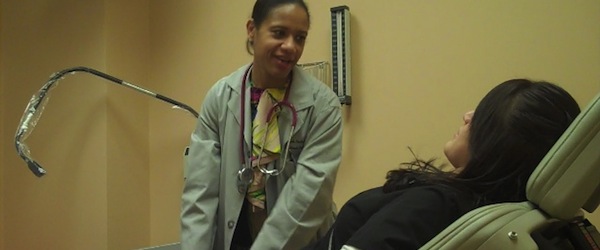
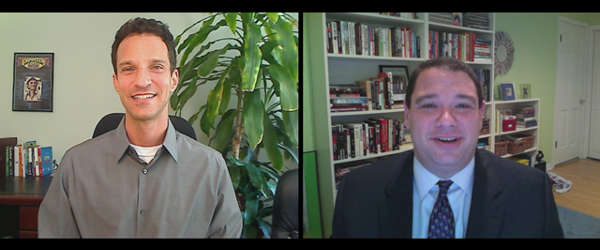
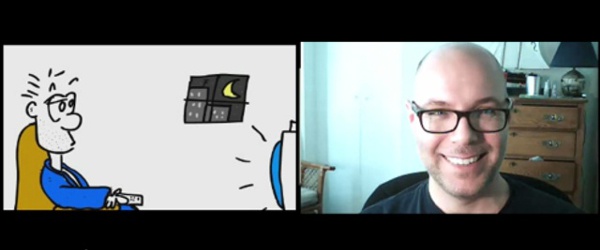
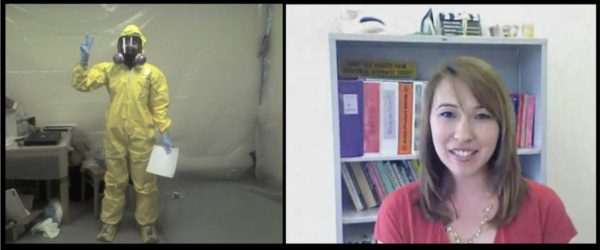
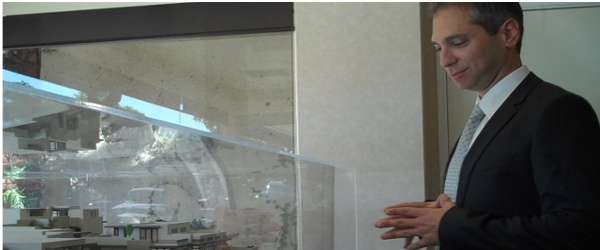
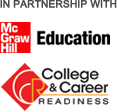
Great interview. Very helpful!
Thanks Vanessa! Great to hear.
Thank you for that! I’m making my first moves in a career change at 32 from being a Middle School Math teacher to nursing and this settled my mind about a lot of questions I had!
Excellent. Glad we could help Heather. Good luck with the career change into nursing! Thanks for commenting.